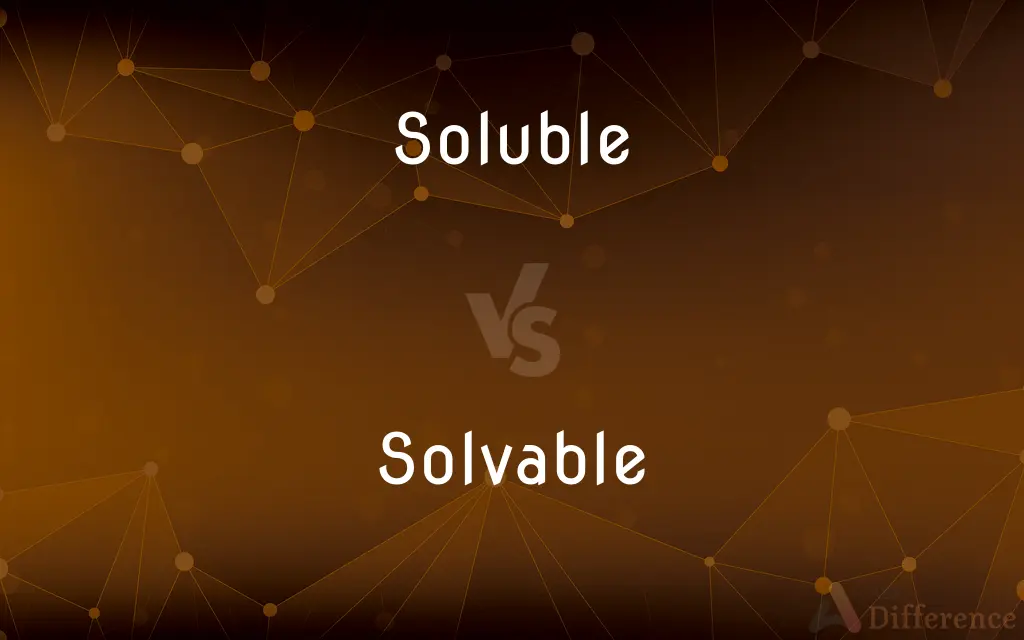Soluble vs. Solvable — What's the Difference?
By Tayyaba Rehman & Urooj Arif — Updated on March 14, 2024
Soluble refers to a substance's ability to dissolve in a solvent, primarily in a liquid, while solvable pertains to a problem or equation that can be solved or resolved.

Difference Between Soluble and Solvable
Table of Contents
ADVERTISEMENT
Key Differences
Soluble is a term used primarily in chemistry to describe a substance's capability to dissolve in a solvent, resulting in a homogeneous mixture known as a solution. For instance, table salt (sodium chloride) is soluble in water. On the other hand, solvable applies more broadly to problems, puzzles, equations, or situations that can be figured out, explained, or resolved. An example of a solvable problem is a mathematical equation for which one can find the value of the unknown.
The concept of being soluble is crucial for understanding various chemical processes and reactions, as it determines how substances interact with each other in different environments. This is vital for fields such as pharmacology, environmental science, and cooking. Conversely, the notion of being solvable is fundamental to areas like mathematics, logic, and technology, focusing on the ability to find answers or solutions through reasoning, experimentation, or computation.
Solubility is influenced by factors like temperature, pressure, and the nature of the solvent and solute, indicating a specific physical and chemical property of a substance. In contrast, whether something is solvable often depends on the information available, the tools or methods used to approach the problem, and sometimes the definition of what constitutes a solution.
In daily language, soluble might also metaphorically refer to a problem that can be 'dissolved' or eliminated, though this is less common. Solvable, however, is regularly used to express optimism about overcoming challenges, indicating a belief in the possibility of finding a solution.
While the term soluble is almost exclusively used in the context of substances dissolving, solvable extends to a wide range of theoretical and practical issues. This demonstrates how the application of solvable is much broader, encompassing any scenario where a solution is sought, regardless of the field or nature of the problem.
ADVERTISEMENT
Comparison Chart
Primary Context
Chemistry, involving substances dissolving.
Broad, involving problems or puzzles being solved.
Key Factors
Temperature, pressure, solvent, and solute nature.
Information available, methods, definition of solution.
Application Fields
Chemistry, pharmacology, environmental science.
Mathematics, logic, technology, various sciences.
Metaphorical Use
Less common, for 'dissolvable' problems.
Common, for optimism in overcoming challenges.
Scope of Use
Specific to physical and chemical properties.
Broad, applicable to theoretical and practical issues.
Compare with Definitions
Soluble
Capable of being dissolved in a solvent.
Sugar is soluble in water, forming a sweet solution.
Solvable
Capable of being solved or explained.
The mystery was finally deemed solvable with the new evidence.
Soluble
Related to a material's interaction with liquids.
Some pollutants are highly soluble in water, posing environmental risks.
Solvable
Pertaining to a problem with a possible solution.
Complex algorithms make previously unsolvable puzzles solvable.
Soluble
Describing a compound's solubility in specific conditions.
Certain gases become more soluble under high pressure.
Solvable
Related to the potential for finding an answer.
With advanced mathematics, many once-impossible equations are now solvable.
Soluble
Pertaining to a substance's dissolution properties.
Salt's soluble nature makes it essential for cooking.
Solvable
Indicating the feasibility of overcoming a challenge.
With innovative technology, reducing carbon emissions is increasingly solvable.
Soluble
Indicating the ease of dissolving.
Insoluble fibers in diet aid digestion by not dissolving in the stomach.
Solvable
Describing situations where resolution is achievable.
Through negotiation, the conflict appeared solvable.
Soluble
Capable of being dissolved, especially easily dissolved
Soluble fats.
Solvable
Possible to solve
Solvable problems.
A solvable riddle.
Soluble
Possible to solve or explain
Soluble mysteries.
Solvable
Capable of being solved.
A solvable problem
Soluble
Able to be dissolved.
Sugar is soluble in water.
Solvable
(obsolete) Capable of being dissolved or liquefied.
Soluble
Able to be solved or explained.
That mystery should be easily soluble.
Solvable
(obsolete) Able to pay one's debts.
Soluble
Susceptible of being dissolved in a fluid; capable of solution; as, some substances are soluble in alcohol which are not soluble in water.
Sugar is . . . soluble in water and fusible in fire.
Solvable
Capable of being paid and discharged.
Solvable obligations
Soluble
Susceptible of being solved; as, a soluble algebraic problem; susceptible of being disentangled, unraveled, or explained; as, the mystery is perhaps soluble.
Solvable
Susceptible of being solved, resolved, or explained; admitting of solution.
Soluble
Relaxed; open or readily opened.
Solvable
Capable of being paid and discharged; as, solvable obligations.
Soluble
(of a substance) capable of being dissolved in some solvent (usually water)
Solvable
Able to pay one's debts; solvent.
Soluble
Susceptible of solution or of being solved or explained;
The puzzle is soluble
Solvable
Possible to solve;
Such problems are perfectly solvable
Common Curiosities
What does it mean for a problem to be solvable?
A problem is solvable if there is a method or process to find a solution, answer, or explanation.
Can all substances be made soluble?
No, solubility depends on the chemical nature of the substance and the solvent; some substances are insoluble under normal conditions.
Are all problems solvable?
Not all problems are solvable with current knowledge or technology, but many can be solved with the right approach and resources.
What makes a substance soluble?
A substance is soluble if it can dissolve in a solvent, depending on molecular interactions and conditions like temperature and pressure.
Is solubility a fixed property?
Solubility can change with conditions such as temperature, pressure, and the chemical nature of the solvent and solute.
How is solubility measured?
Solubility is measured by the maximum amount of a solute that can dissolve in a given amount of solvent at a specific temperature and pressure.
Does solubility apply to gases and liquids, or just solids?
Solubility applies to gases, liquids, and solids; gases can dissolve in liquids, and liquids can dissolve in each other or in solids, depending on the substances involved.
Is there a mathematical way to determine if a problem is solvable?
For certain types of problems, particularly in mathematics and computer science, there are mathematical criteria and algorithms that can determine solvability, but this depends on the nature of the problem.
Can a substance's solubility be predicted accurately?
While models and rules exist to predict solubility based on molecular structure and solvent properties, exceptions and complex interactions can make accurate prediction challenging without empirical data.
How does temperature affect solubility?
Temperature can significantly affect solubility; for many solids in liquids, solubility increases with temperature, while for gases in liquids, solubility typically decreases as temperature rises.
What makes a problem more solvable?
Access to more information, effective methodologies, and innovative thinking can make a problem more solvable.
Can a problem's solvability change over time?
Yes, as new information, technologies, or methods are developed, problems previously deemed unsolvable may become solvable.
Share Your Discovery

Previous Comparison
Bourd vs. Bour
Next Comparison
Pleasure vs. WillAuthor Spotlight
Written by
Tayyaba RehmanTayyaba Rehman is a distinguished writer, currently serving as a primary contributor to askdifference.com. As a researcher in semantics and etymology, Tayyaba's passion for the complexity of languages and their distinctions has found a perfect home on the platform. Tayyaba delves into the intricacies of language, distinguishing between commonly confused words and phrases, thereby providing clarity for readers worldwide.
Co-written by
Urooj ArifUrooj is a skilled content writer at Ask Difference, known for her exceptional ability to simplify complex topics into engaging and informative content. With a passion for research and a flair for clear, concise writing, she consistently delivers articles that resonate with our diverse audience.














































